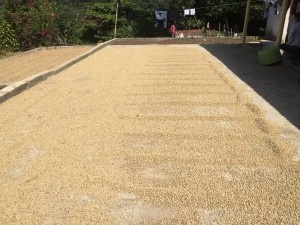As Sustainable Harvest®’s Coffee Quality Manager in Colombia, I spend at least one week out of every month visiting producers all around the country. I’m constantly in communication with the organizations we work with: giving cupping feedback, organizing trainings and calibrations, and making suggestions based on roasters' needs.
During each trip, I learn something new about these farms and organizations. I see their projects progress. I hear about their struggles. I taste coffees from their latest harvest. I get excited about their experiments. Each trip has a different purpose.
In October I visited Cooagronevada in northern Colombia for what we at Sustainable Harvest® call a farm diagnostic visit. Diagnostics are like a yearly medical exam: They provide an overview of how an organization is doing and allow us to compare data over the years. They take the pulse of the community and help me decide which areas to focus on when working with each cooperative.
This year we launched the Checkmark program. Checkmark is the culmination of years of impact measuring, field surveys, and learnings about which questions to ask, in what format, and why. Checkmark blends together questions about responsible sourcing with analysis on quality and environmental stewardship.
 At Cooagronevada I sat down with general manager Sandra Palacios to go over Checkmark. I have Checkmark on an iPad app that changes dynamically whenever I input information. Even though Cooagronevada is certified Fair Trade and Organic, we still have to ask them fundamental due-diligence questions. It’s like taking the pulse and blood pressure: You don’t expect anything to be irregular, but you have to check. We talk about the basics of fair labor practices and human rights protections. Then we move on to technical production to see how the farmers are processing, drying, and analyzing their coffee for export. We go into detail on agronomy practices, community projects, and access to contract financing.
At Cooagronevada I sat down with general manager Sandra Palacios to go over Checkmark. I have Checkmark on an iPad app that changes dynamically whenever I input information. Even though Cooagronevada is certified Fair Trade and Organic, we still have to ask them fundamental due-diligence questions. It’s like taking the pulse and blood pressure: You don’t expect anything to be irregular, but you have to check. We talk about the basics of fair labor practices and human rights protections. Then we move on to technical production to see how the farmers are processing, drying, and analyzing their coffee for export. We go into detail on agronomy practices, community projects, and access to contract financing.
 Checkmark provides us with a holistic view of the organization. Combined with information on sample scores and on-time deliveries, I’m able to give Cooagronevada valuable feedback about their performance compared to our other suppliers. Using this data collection process throughout our supply chain helps us become more insightful, strengthens producer organizations and relationships, and develops shared values on sustainability, labor protections, and quality.
Checkmark provides us with a holistic view of the organization. Combined with information on sample scores and on-time deliveries, I’m able to give Cooagronevada valuable feedback about their performance compared to our other suppliers. Using this data collection process throughout our supply chain helps us become more insightful, strengthens producer organizations and relationships, and develops shared values on sustainability, labor protections, and quality.



.png)
